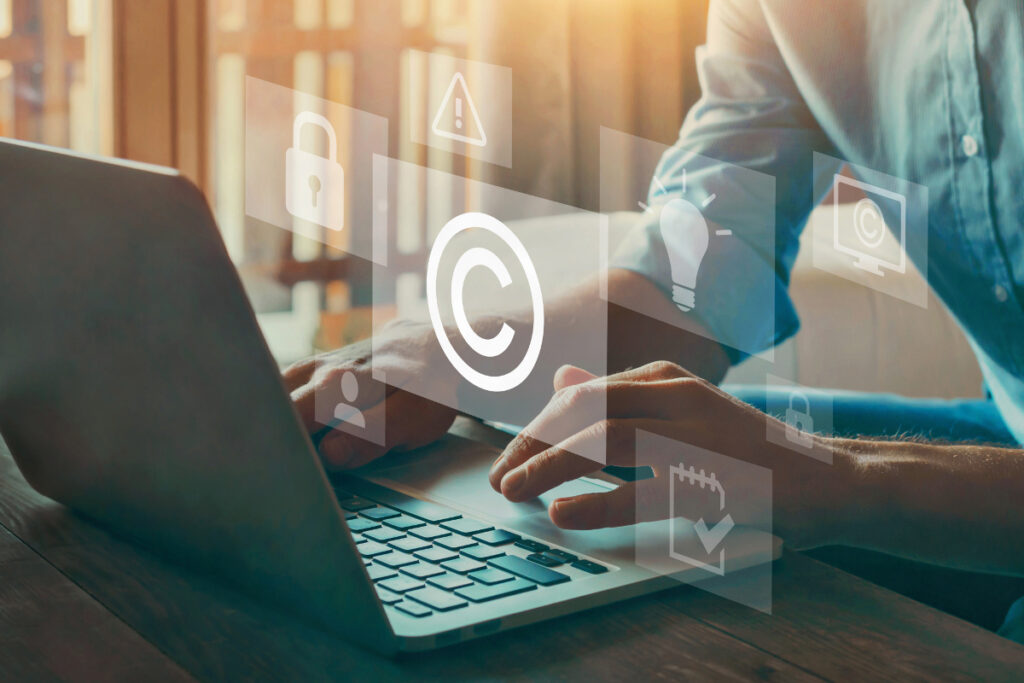The battle between surging AI development and artist copyright is markedly different from one side of the pond to the other. In the US, the Writers Guild of America (WGA) demands that media companies take action against tech firms using copyrighted content for their training materials. Meanwhile, new copyright laws in the UK aim to protect celebrities from AI copyright infringement. The AI and copyright debate continues.
WGA Letter Asks for Copyright Protection From AI Exploitation
The Writers Guild of America (WGA) has directly challenged major Hollywood studios and Netflix. They’re calling for legal action against technology companies allegedly using copyrighted content to train AI systems without permission. This request follows a recent report in the Atlantic claiming that companies including Apple, Anthropic, Meta, and others have utilized a training dataset containing dialogue from tens of thousands of films and TV episodes.
The WGA’s sent their letter to the leadership of major studios like Amazon MGM Studios, Sony, NBCUniversal, Warner Bros Discovery, Netflix, and Disney. It emphasizes that the 2023 collective bargaining agreement secured after the writers’ strike explicitly requires studios to protect writers’ copyrights. The guild argues that studios have failed to prevent tech companies from exploiting their intellectual property, effectively allowing the unauthorized use of content created by generations of union workers.
Master Basic Agreement and Unauthorized Use of Content
The letter specifically references Article 50 of the Master Basic Agreement (MBA). This document states that studios hold certain writers’ rights “in trust” and have a fiduciary responsibility to protect against unauthorized use, including AI training purposes. The WGA contends that tech companies are now attempting to profit twice from this alleged theft by selling AI services back to the studios that incorporate plagiarized content from WGA members.
AI’s Use of Copyrighted Material
This development marks a significant escalation in the ongoing debate over AI’s role in the entertainment industry—a central issue during the 2023 writers’ strike. Given the industry’s historically aggressive approach to combating piracy, the WGA argues that the studios’ current inaction against AI companies’ use of copyrighted material amounts to a double standard that directly harms writers’ interests.
AI and Right of Personality
The UK government is planning a significant overhaul of copyright laws to address AI-related challenges. A key feature is a new “right of personality” that would allow celebrities to take legal action against AI companies that commercially exploit their likeness or voice without permission. This legislation is modeled after existing US state laws and comes in response to recent high-profile cases, such as Scarlett Johansson’s dispute with OpenAI over voice replication.
AI Investment and Creative Rights
The proposed changes aim to balance protecting creative rights while attracting AI industry investment. Key provisions include requiring AI companies to disclose their training data sources and implementing a “rights reservation” system allowing creators to opt out of having their work used for AI training. However, this opt-out approach has faced criticism from creative industry stakeholders.
Creators Say Reforms Don’t Go Far Enough
The creative sector, representing £126 billion (US$157B) of the UK economy, has strongly opposed aspects of the reforms. Major companies including Disney, Fox, and Universal Music have warned against weakening existing copyright protections. Critics argue that the proposed changes could enable AI companies to create unauthorized derivative works without compensation.
Proposed Amendments to Data Bill Gain Artists’ Support
The government’s position is that the UK’s current copyright laws are among the world’s most restrictive and need modernization to attract AI investment. While new legislation isn’t expected until mid-2025, Baroness Kidron is proposing immediate amendments to a data bill that would give creators more control over their work’s use in AI training. Her proposals have gained support from prominent figures like Paul McCartney and author Kate Mosse.
The debate highlights the tension between fostering AI innovation and protecting creative rights, with government sources emphasizing their aim to create a “bespoke system” beneficial to both sectors. However, critics view the reforms as potentially undermining existing copyright protections and enabling “theft at scale” of creative works.

